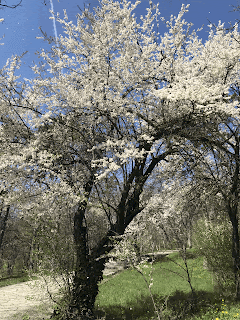I was not "better", last week. I recounted to a colleague a deviant statement made by a third colleague who had shared his understanding that university be akin to kindergarten for adults (his view rendering the essay redundant, laughable work). I realised afterwards just how wrong that was of me on so many levels. I recount the specifics here only to show an example of what I consider to provoke a self-righteous response. But here is another response: what if one understands that other people are always, in their minds, doing the best they can? It doesn't make sense to criticise their actions (outside of classrooms - though even correction of students can be done in multiple ways). The question is whether one can navigate around Scylla and Charybdis, accepting them in their present state (for who would want to be blocked the opportunity for later change? So why would one slap a judgement on someone else?) The question is whether we can try to help those around us grow, just as we see we need to grow, and also would like help ourselves. Is this not the pedagogical mission? And if we claim to be teachers/instructors/etc. and are not doing this, are we truly what we claim to be?
Another thing I have noticed is how much fear can build up inside that distorts vision. I am pretty sure that this fear has caused me to act in an uncalled for way from time to time, which is to say that I have caused my own problems.
 |
| Brush |
Can I try to experiment to live without fear? To inhabit moment to moment and stop worrying?
Can I experiment to try to find my voice and what it is that I have felt for so long now that I need to write? Academic fear is very real: one knows that one's arguments can easily be refuted, that one can never have read all the relevant books... But the very beautiful pragmatic American approach says: cut your losses and begin. Begin to have any chance whatsoever at getting somewhere. And the time is nigh when you can start to riff from idea to idea and know what sources there are behind those ideas.
I will end this post on one idea I am thinking about. It has to do with some of the sources behind the idea that we should all be heard, which I hope this post makes clear that I respect. That said, some of the models for that approach quickly veer off into relativistic cacophony or willful ignorance. For example, one paper, quite prominent in the field of contrastive rhetoric, stresses how "classroom dialogue that underscores difference in rhetoric ... could perpetuate Othering, cultural stereotyping, and unequal relations of power." It is astonishing that it is assumed that equal relations of power is that simple. In fact, this entire post, written by someone who shirks at the idea of lording over others, demonstrates that despite such antipathies, self-righteous impulses can develop and be at once made manifest while remaining latent. What of those who are not self-critical? Does experience not teach that something is always in power, that hierarchy will exist in one way or another? Note that this does not mean to say that attempts at unity are futile; rather, the spirit in which one approaches unity is most pertinent.
This is why the pursuit of large words like truth and equality is to be stressed. Nowhere in Plato will you find a prescription for the achievement of such goals; in fact, Socrates says that he can only pursue truth and never possess it. It is not a complicated idea, this humility. But it is an unpopular one.
While children's books generally present truth and equality as virtues that can be achieved, I would like to point out that as adults, very few live by those precepts. How many adults forgive the person who stole their metaphorical lollipop? Or who confess, in the end, to stealing it in a moment of weakness? Or who live with an open heart?
Indeed, my colleague may have unwittingly been on to something when he equated university with kindergarten because it could truly be asked whether we would all pass the test we put to children. We ask of the child to temper its zeal and to be patient. Etc. Such growth of character is crucial to the prolonged existence of humanity. The experiment here is to find ways to retain the rudimentary lessons of childhood in order to fully be the adult.
 |
| Brush |

No comments:
Post a Comment